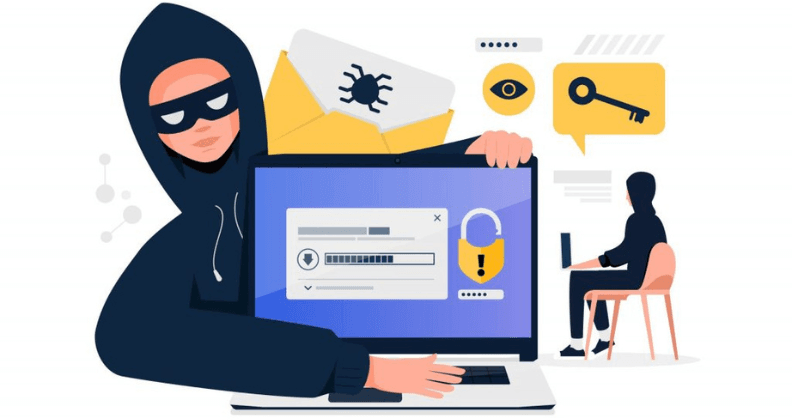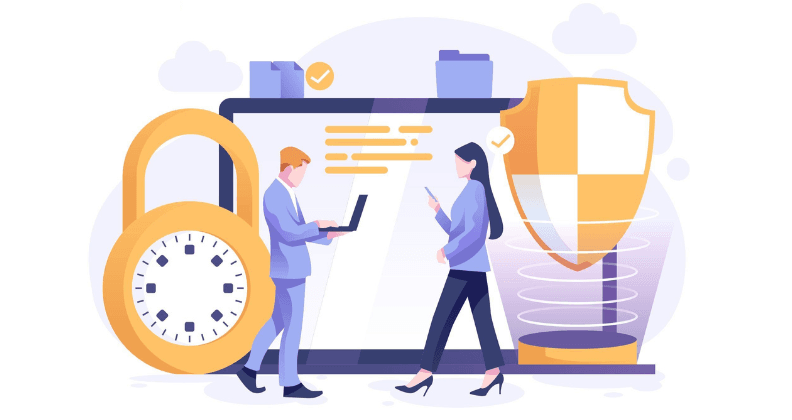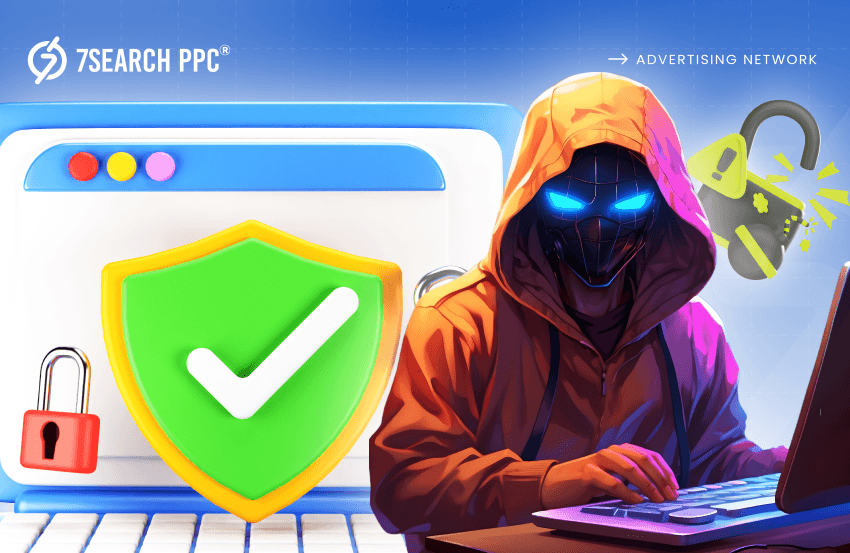In the era when digitalization has been increasing rapidly, and technology has been blooming, one can see and utilize various advantages of it. But everything in this world that provides some advantages also has some disadvantages. Due to digitalization, business owners have no other choice than to take their businesses online.
This is done by creating websites for their businesses. The biggest challenge in this era of increasing digitalization is to protect your website from hackers because your website has some secret information that needs to be hidden. This blog will be centered on cyber attacks and different ways to protect your website from hackers’ attacks.
What Do You Understand By A Cyber Attack?
It can be defined as an attack on a computer system or a website done for the purpose of destroying, sabotaging, or stealing information. The people who conduct these cyber attacks are called hackers. The reasons why hackers attack business websites could be many, such as financial gains, destroying content, and stealing information.
These attacks are conducted by hackers through various methods. These methods include enticing users to click a malicious link, tricking them into entering their personal information on fake pages and websites, etc.
Hacking Of Websites And Their Types
Before diving into the techniques to protect your website, first, let’s understand the different ways in which websites get hacked:
Ransomware Hack
This is a type of hacking technique in which the hacker encrypts the victim’s content file. This malware attack is called a ransomware attack. To release this malware, the hacker demands a ransom amount from the owner of the content file.
The victim is usually directed to a webpage in order to pay the ransom so that he/she can get the decryption key to unlock the content file. You should hire good developers who have some anti-hacking skills in order to protect your website from such hackers.

Gibberish Hack
Gibberish hack is done to take advantage of genuine traffic of a website in the way that it aims to drive that traffic to some other website. This hack automatically inserts unnecessary pages into a website that contains nonsensical content stuffed with keywords. There are URLs contained in these web pages to entice users to click them in order to drive them to some unrelated websites, such as adult or gambling ones.
Distributed Denial Of Service (DDoS)
This kind of attack attempts to bring the website or a network to a halt by overwhelming it with fake or bot traffic so the users cannot access it. A Distributed Denial of Service (DDoS) attack denies the users who legitimately try to access your website or network.
Code Injection Hack
A Code injection hack refers to the harmful code that is entered into a computer system. This malicious code enters into a system when either the input or the output is not validated properly. Once this code is entered into your system, its security gets compromised. Also, once the malicious code enters your system, the hacker can do more damage to your system.
Brute Force Attack
A brute force attack involves multiple attempts of password combinations on your system until the hacker gets the right one. This is a time-consuming attack and requires a lot of patience from the hackers. The best way to protect your website from this type of attack is to create long passwords using numbers, alphabets, and special characters.
There are various other kinds of hack attacks that you can fall victim to, but these are the most common ones. In order to protect your website, you should hire some people who have the skills and expertise to deal with such kinds of issues.
Why Is It Necessary to Protect Your Website?
It is crucial to protect your website from hackers due to the following reasons:
Sensitive Data
A website contains sensitive data that is related to its clients and those who work for that business website. So, you, as the business and website owner, have the responsibility to protect everyone’s data and information.
Trust And Reputation
If your website gets hacked, then it is not good for the reputation of your business, and people might lose trust in you as well. This will definitely affect your business adversely.
Compliance With Rules And Regulations
There are many industries that need to comply with certain rules and regulations regarding security and protection of data. If they fail to do so, then the owners might face some serious repercussions, such as hefty fines and suspension of their business/website.
10 Strategies And Measures to Protect Your Website
In this section, we will discuss some strategies and measures that can be used to protect your website. So, let’s begin:

Software Update
This is one of the most basic things to do in order to protect your website. You must keep all the software, including content management systems and plugins. Although this is the most basic step, people tend to ignore it.
You must regularly check for software updates, as these updates provide new security features. If you do not update software regularly, then it becomes a “piece of cake” for hackers to hack your website and online content because they can find vulnerabilities in outdated software with ease.
Strength Of The Password
This is another fundamental thing to do to protect your website from online attackers. You should create a password that is pretty good length and a combination of alphabets, special characters, and numerals.
Strong Access Control
You should consider using strong access steps before allowing someone access to the sensitive areas of your website. You can include multiple levels before allowing access to someone who is new to your website. The number of login attempts can also be curbed.
Install And Implement A Firewall Software
Firewall software is a fundamental security software that you should have for your website and system’s protection from online attacks. It is a barrier between your website and several hacking activities. If it senses that some malicious software is trying to get access to your website or system, it blocks it or denies access.
Install SSL (Secure Socket Layer) Certificate
An SSL (Secure Socket Layer) certificate encrypts the data that is transmitted between your website and the visitor’s browser. This ensures that sensitive information, such as login credentials and payment details, remains secure. The best thing about installing an SSL certificate is that it not only protects your website but also improves its search engine ranking because search engines give priority to those sites that are secured.
Regular Backing Up Of Data
It is highly helpful if you regularly back up your website’s data to some off-site location. The reason for this is pretty simple. If you regularly back up your site’s data, then in case of a data breach, you can restore your website and its details to its pre-hack settings quickly.
Monitor Your Website’s Activity Regularly
When you partner with a good ad network, it provides you with various analytics and security tools. Your website can be protected with the use of these tools. By keeping a regular eye on the activities of your website, you can detect any irregular and unusual activities, such as instant traffic surges and coming high traffic from the same IP address at the same time.
Educate Your Team
Another important step in protecting your website from hackers is to educate your team about several hacking attempts, how to recognize them, and finally, how to tackle such kinds of situations.
Limit User Permission
You should restrict people from other departments from accessing information from other departments. Also, if someone from outside of your organization tries to access any information from your website, he/she must be made to go through multiple security checkup steps.
Regular Security Audits
When you conduct regular security audits on your website, then you can easily discover any vulnerabilities that your website possesses. You should hire cybersecurity professionals who can conduct such audits and cure the vulnerabilities if they find any.
Conclusion
In the end, we just want to say that in order to protect your website from hacker attacks, you should use the tactics and strategies that we have discussed in this blog. It is crucial that you protect your website because it contains sensitive information that is really important for the reputation of your company. Always remember that investing in the security of your website can protect you from the costly repercussions of tomorrow.
Frequently Asked Questions (FAQs)
What is a cyber attack?
Ans. An attack on a network that is done in order to sabotage or misuse information present is called a cyber attack.
Name any 3 types of hack attacks.
Ans. 3 popular hack attacks are ransomware hack, gibberish hack, and distributed denial of services (DDoS).
Why is it needed to protect your website from hack attacks?
Ans. It is needed to protect your website from hack attacks because once your website gets hacked, the sensitive information present on it can be misused by them, and it is harmful to your website’s reputation.
What is an SSL certificate?
Ans. SSL stands for “secure socket layer.” An SSL certificate encrypts the data between the user’s browser and the website’s browser. An SSL certificate not only helps protect your website but also helps improve your website’s search engine rank.
What is the role of a strong password in protecting your website?
Ans. A strong password that includes alphabets, special characters, and numbers is pretty hard to guess. Thus, it is pretty helpful to protect your website.
















